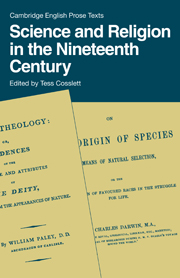Book contents
- Frontmatter
- Contents
- Editorial note
- Introductory essay
- 1 WILLIAM PALEY, Natural Theology (1802), Chapters 1–3
- 2 ROBERT CHAMBERS, Vestiges of the Natural History of Creation (1844), Chapter 14, ‘Hypothesis of the Development of the Vegetable and Animal Kingdoms’
- 3 HUGH MILLER, The Testimony of the Rocks (1857), Lecture Fifth, ‘Geology in its Bearings on the Two Theologies’, Part I
- 4 CHARLES DARWIN, On the Origin of Species (1859), Chapter 14, ‘Recapitulation and Conclusion’
- 5 CHARLES GOODWIN, ‘On the Mosaic Cosmogony’, Essays and Reviews (1860)
- 6 LEONARD HUXLEY, Life and Letters of Thomas Henry Huxley (1903), vol. 1, Chapter 14, ‘1859-1860’
- 7 CHARLES DARWIN, The Descent of Man (1871), Chapter 21, ‘General Summary and Conclusion’
- 8 JOHN TYNDALL, ‘The Belfast Address’, Nature, 20 August 1874
- 9 FREDERICK TEMPLE, The Relations between Religion and Science (1884), Lecture VI, ‘Apparent Collision between Religion and the Doctrine of Evolution’; and Lecture VIII, ‘The Conclusion of the Argument’
- Notes
- Select booklist
6 - LEONARD HUXLEY, Life and Letters of Thomas Henry Huxley (1903), vol. 1, Chapter 14, ‘1859-1860’
Published online by Cambridge University Press: 18 January 2010
- Frontmatter
- Contents
- Editorial note
- Introductory essay
- 1 WILLIAM PALEY, Natural Theology (1802), Chapters 1–3
- 2 ROBERT CHAMBERS, Vestiges of the Natural History of Creation (1844), Chapter 14, ‘Hypothesis of the Development of the Vegetable and Animal Kingdoms’
- 3 HUGH MILLER, The Testimony of the Rocks (1857), Lecture Fifth, ‘Geology in its Bearings on the Two Theologies’, Part I
- 4 CHARLES DARWIN, On the Origin of Species (1859), Chapter 14, ‘Recapitulation and Conclusion’
- 5 CHARLES GOODWIN, ‘On the Mosaic Cosmogony’, Essays and Reviews (1860)
- 6 LEONARD HUXLEY, Life and Letters of Thomas Henry Huxley (1903), vol. 1, Chapter 14, ‘1859-1860’
- 7 CHARLES DARWIN, The Descent of Man (1871), Chapter 21, ‘General Summary and Conclusion’
- 8 JOHN TYNDALL, ‘The Belfast Address’, Nature, 20 August 1874
- 9 FREDERICK TEMPLE, The Relations between Religion and Science (1884), Lecture VI, ‘Apparent Collision between Religion and the Doctrine of Evolution’; and Lecture VIII, ‘The Conclusion of the Argument’
- Notes
- Select booklist
Summary
This extract gives a description (or rather, several descriptions) of the famous encounter between T. H. Huxley and Bishop Samuel Wilberforce at the British Association in 1860. Unfortunately, no full contemporary account of the affair exists, which may indicate that at the time it was not thought so important or so decisive as it later became in the retrospective accounts of the Darwinian party. It is significant that no one seems to be able to remember exactly what it was that Huxley said in his famous retort to the Bishop: ‘he stood before us and spoke those tremendous words - words which no one seems sure of now, nor, I think, could remember just after they were spoken, for their meaning took away our breath, though it left us in no doubt as to what it was’, as one writer rather lamely puts it. In evaluating the significance of the incident, we must consider three main points: first, the attitudes of the contemporary press, the audience, and Wilberforce himself - did they think Huxley had scored a victory? Secondly, Wilberforce's status as a critic of Darwinism: was he really as ill-informed and unintelligent as his enemies made out, and did he have no right, as a clergyman, to speak on scientific matters? Thirdly, the aggressive nature of Huxley's defence of Darwin: what interest did he have in creating a myth of ‘warfare’ between science and religion?
- Type
- Chapter
- Information
- Science and Religion in the 19th Century , pp. 145 - 155Publisher: Cambridge University PressPrint publication year: 1984



